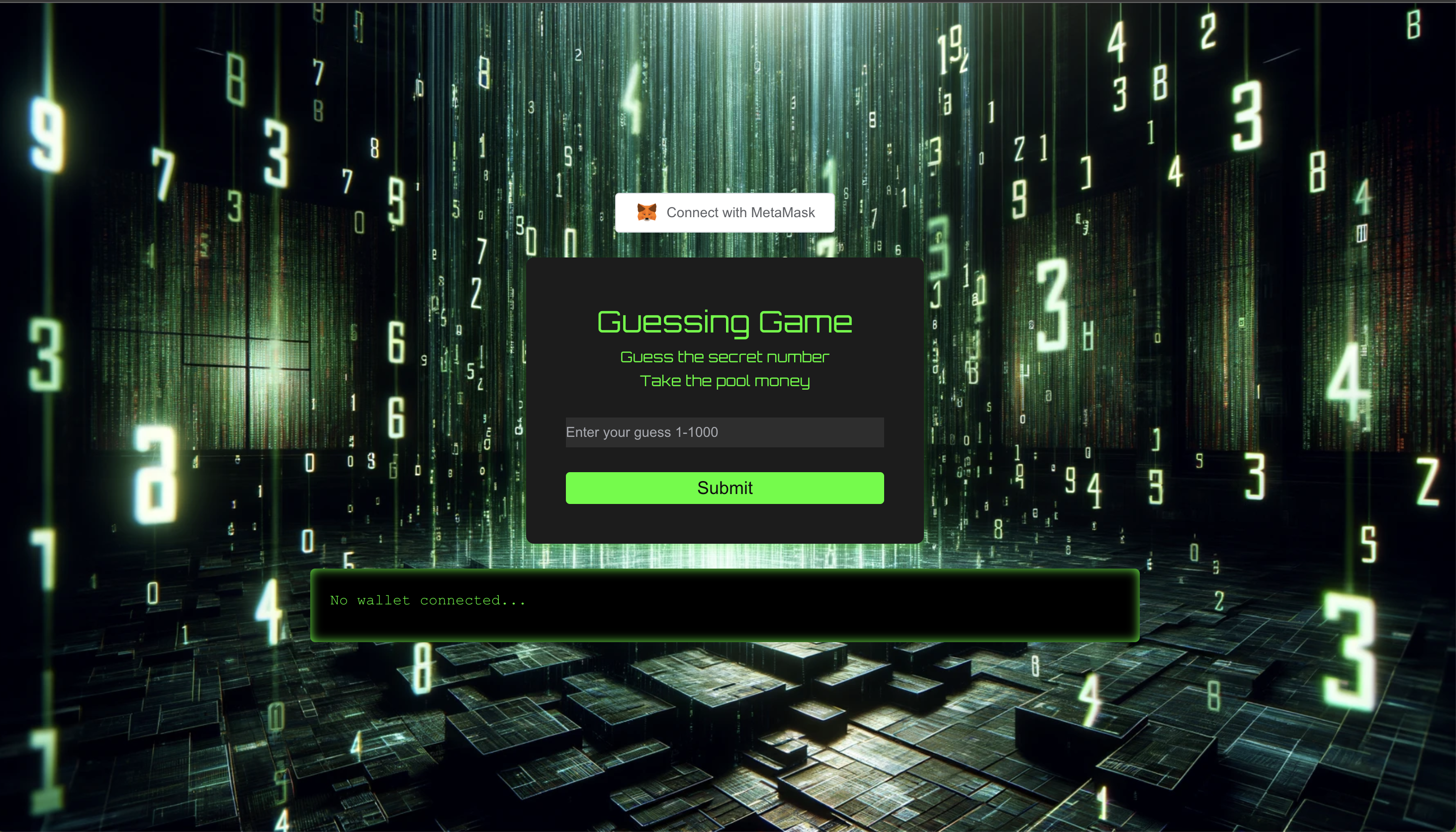Guessing Game

The Ten Guessing Game is a simple yet powerful demonstration of Ten's unique encryption capabilities. Players attempt to guess a secret number, with each guess requiring a token fee. The game showcases the challenges of maintaining secrecy in transparent ecosystems like Ethereum and how Ten addresses these challenges.
Game Mechanics
- The game's objective is to guess a secret number.
- Each guess requires an entrance fee of 1 unit of the token (1x10^18 units make a single token).
- Correct guesses result in the player receiving all accumulated entrance fees.
- The game then resets with a new random secret number.
Playing the Game
How to Play the Guessing Game: A Step-by-Step Guide This guide assumes you have a Metamask wallet installed and configured with the Ten testnet.
-
Verify Gateway Authentication: Ensure your connected account is properly authenticated through the Ten Gateway.
-
Visit the Game Website: Navigate to the official website of the guessing game.
You can get free testnet tokens from the Ten Faucet.
-
Make Your Guess: Enter your guess for the secret number within the designated field. This number should be within the specified range (e.g., 1-1000).
-
Sign the Transaction: Click on the "Submit" or similar button. A Metamask window will pop up asking you to sign a transaction authorizing your guess on the blockchain. Carefully review the transaction details and gas fees before confirming.
-
Wait for the Result: The transaction will be processed on the blockchain, and it may take a few seconds to minutes for the result to be confirmed. You can see the status/result of your guess on the message log below the guessing field.
-
Inspect the Transaction (Optional): You can explore the details of your guess transaction on the block explorer - Tenscan.This will allow you to see the status, gas usage, and other details associated with your guess.
Building the Guessing Game
This tutorial will guide you through building the Guessing Game on TEN with secure RNG to generate truly random & secure numbers as well as hidden states to make sure the random number to be guessed is secret.
-
Pre-requisites:
-
Generate Secure Random Number: We'll use
block.difficultyto generate a random number. On TEN,block.difficultyis private and secure, unlike on Ethereum, where it can be manipulated or predicted.
// SPDX-License-Identifier: MIT
pragma solidity ^0.8.18;
contract GuessingGame {
uint256 private secretNumber;
constructor() {
_generateSecretNumber();
}
function _generateSecretNumber() private {
uint256 randomNumber = block.difficulty;
secretNumber = (randomNumber % 100000) + 1;
}
}
- Store the Random Number Privately: TEN offers true on-chain encryption for state variables marked with the private modifier. Even using
getStorageAt, these variables cannot be accessed.
uint256 private secretNumber;
This ensures that secretNumber is stored securely and is inaccessible to anyone outside the contract.
- Function to Guess the Number: The guessing function allows users to submit their guess for the secret number. If correct, they win the prize pool. If incorrect, they are encouraged to try again.
function guess(uint256 _number) external payable {
require(_number > 0 && _number <= 100000, "The guess should be between 1 & 100000");
require(msg.value == 443e14, "Incorrect Fee");
if(_number == secretNumber) {
payable(msg.sender).transfer(address(this).balance);
_generateSecretNumber(); // Reset the secret number after a successful guess
} else {
}
}
- Function to See the Prize Pool: This function allows users to view the current prize pool, which is simply the contract's balance.
function getContractBalance() external view returns (uint256) {
return address(this).balance;
}
- Feature to Reset the Secret Number After It Has Been Guessed: After a successful guess, the secret number should be reset to keep the game going. This is handled within the guessing function:
function _generateSecretNumber() private {
uint256 randomNumber = block.difficulty;
secretNumber = (randomNumber % 100000) + 1;
}
By calling _generateSecretNumber() again, the contract resets the secret number, allowing the game to continue with a new random number.
Find the complete contract & frontend here: this GitHub repository.